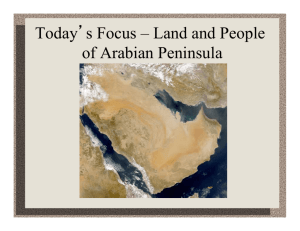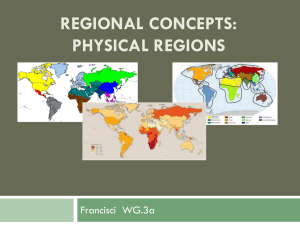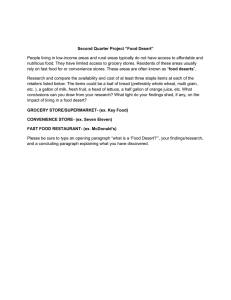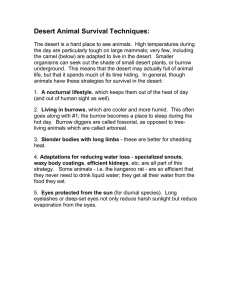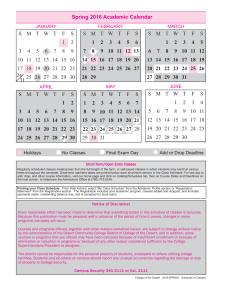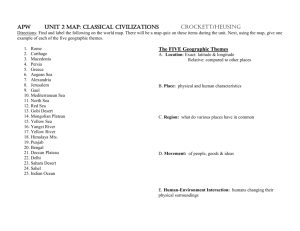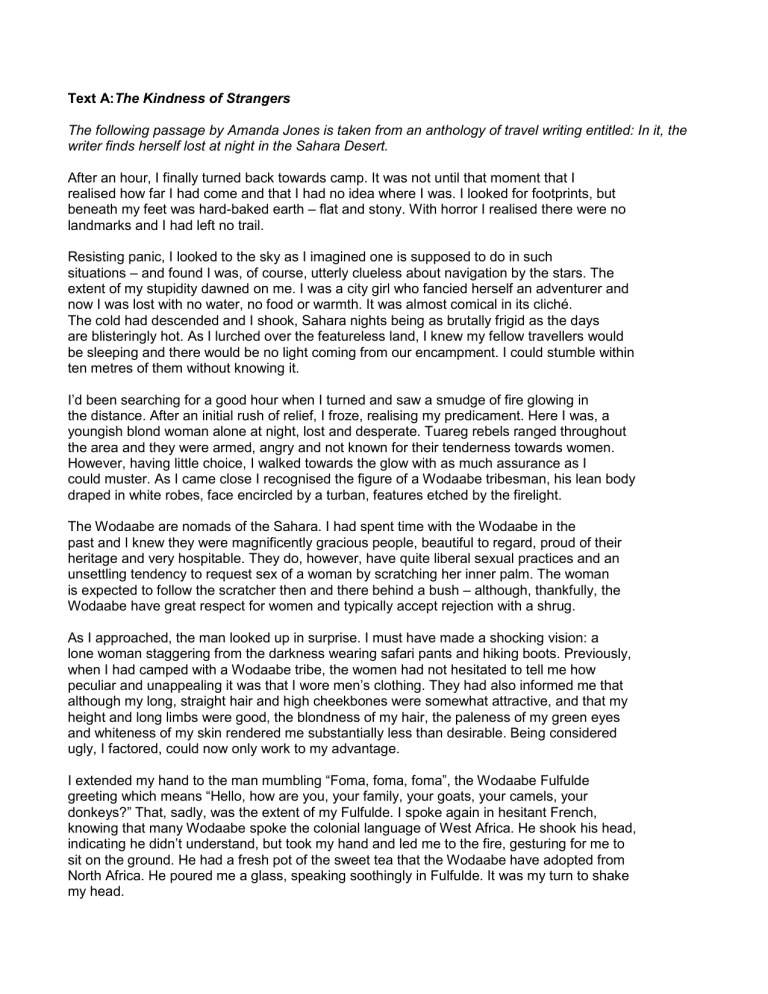
Text A:The Kindness of Strangers The following passage by Amanda Jones is taken from an anthology of travel writing entitled: In it, the writer finds herself lost at night in the Sahara Desert. After an hour, I finally turned back towards camp. It was not until that moment that I realised how far I had come and that I had no idea where I was. I looked for footprints, but beneath my feet was hard-baked earth – flat and stony. With horror I realised there were no landmarks and I had left no trail. Resisting panic, I looked to the sky as I imagined one is supposed to do in such situations – and found I was, of course, utterly clueless about navigation by the stars. The extent of my stupidity dawned on me. I was a city girl who fancied herself an adventurer and now I was lost with no water, no food or warmth. It was almost comical in its cliché. The cold had descended and I shook, Sahara nights being as brutally frigid as the days are blisteringly hot. As I lurched over the featureless land, I knew my fellow travellers would be sleeping and there would be no light coming from our encampment. I could stumble within ten metres of them without knowing it. I’d been searching for a good hour when I turned and saw a smudge of fire glowing in the distance. After an initial rush of relief, I froze, realising my predicament. Here I was, a youngish blond woman alone at night, lost and desperate. Tuareg rebels ranged throughout the area and they were armed, angry and not known for their tenderness towards women. However, having little choice, I walked towards the glow with as much assurance as I could muster. As I came close I recognised the figure of a Wodaabe tribesman, his lean body draped in white robes, face encircled by a turban, features etched by the firelight. The Wodaabe are nomads of the Sahara. I had spent time with the Wodaabe in the past and I knew they were magnificently gracious people, beautiful to regard, proud of their heritage and very hospitable. They do, however, have quite liberal sexual practices and an unsettling tendency to request sex of a woman by scratching her inner palm. The woman is expected to follow the scratcher then and there behind a bush – although, thankfully, the Wodaabe have great respect for women and typically accept rejection with a shrug. As I approached, the man looked up in surprise. I must have made a shocking vision: a lone woman staggering from the darkness wearing safari pants and hiking boots. Previously, when I had camped with a Wodaabe tribe, the women had not hesitated to tell me how peculiar and unappealing it was that I wore men’s clothing. They had also informed me that although my long, straight hair and high cheekbones were somewhat attractive, and that my height and long limbs were good, the blondness of my hair, the paleness of my green eyes and whiteness of my skin rendered me substantially less than desirable. Being considered ugly, I factored, could now only work to my advantage. I extended my hand to the man mumbling “Foma, foma, foma”, the Wodaabe Fulfulde greeting which means “Hello, how are you, your family, your goats, your camels, your donkeys?” That, sadly, was the extent of my Fulfulde. I spoke again in hesitant French, knowing that many Wodaabe spoke the colonial language of West Africa. He shook his head, indicating he didn’t understand, but took my hand and led me to the fire, gesturing for me to sit on the ground. He had a fresh pot of the sweet tea that the Wodaabe have adopted from North Africa. He poured me a glass, speaking soothingly in Fulfulde. It was my turn to shake my head. Wodaabe are officially Muslims, although they, like the Tuaregs, have their own interpretation of Islam. They wear the sweeping robes of desert dwellers – designed to capture and swirl air around the skin – but it is the men who cover their heads, not the women. Good looks are highly esteemed, and they are in fact a striking people – tall, thin, mocha-skinned and fine-featured. My rescuer looked to be in his thirties. His eyes were widely spaced, almond shaped and molten brown. I gazed at him, knowing that it mattered how sure of myself I was. If I seemed fearful, he might consider taking advantage of the situation. I spoke to him in English and French, aware it was useless, but gesturing blindly into the darkness to indicate I was lost and needed to find my camp. He stared at me wisely, although I had no idea what, if anything, he understood. He made no movement other than squatting on his haunches and pouring tea from high above the glass, returning the first serving back to the pot, as is tradition, then pouring again until the amber liquid frothed. I stopped speaking entirely and felt the immensity of the desert. I looked about me and understood that this would be a memory that would exist in me forever. I saw myself, finally warm beside this fire, drinking tea with a stranger with whom I shared no more than two common words. My life was as odd to him as his was to me. In all likelihood, he had never ridden in a car, had never seen a city, knew nothing of computers or telephones. Yet it was his knowledge I now needed, my own modern skills having proved useless. And what I needed most was for him to be kind to me. After some time of drinking tea in silence, my host rose, checked the tether on his camel and beckoned to me. I followed the softly billowing whiteness of his robes into the night. We walked in quiet, although at times I would burst into speech, feeling awkward with such great silence in the presence of another. He would turn and smile but say nothing, continuing to move effortlessly over the stony earth. Several times he stopped and took my hand. When he first did this I tensed, anticipating the scratch of the palm. But it never came. We just walked like that, hand in hand, and quickly the oddity faded. Wodaabe and Tuareg men hold hands quite comfortably, and I knew it did not have the same romantic implications as in our culture. Within thirty minutes a cluster of mosquito nets loomed not three metres in front, and then the humped shapes of the sleeping bodies beneath them. His finding this small encampment in the dark seemed to me utterly miraculous. I turned to him, put my hand over my heart and said the only other word I knew in Fulfulde: “Abarkidi”. Thank you. He laughed, his perfect teeth gleaming, then covered his heart and backed away, raising both hands upward in farewell. I stood still and watched until the desert night reclaimed him. Read Text A, The Kindness of Strangers, in the insert and then answer Questions 1(a)–(e) on this question paper. Question 1 (a) Give two reasons why the writer feels panicked at the beginning of the text. • ................................................................................................................................................ • ........................................................................................................................................... [1] (b) Using your own words, explain what the text means by: (i) ‘ Sahara nights being as brutally frigid as the days are blisteringly hot.’ (lparagraph 2) .................................................................. ...................................................................................................................................... [2] (ii) ‘ the featureless land’ (paragraph 2): ................................................................ ...................................................................................................................................... [2] (c) Re-read paragraph 4, (‘The Wodaabe are nomads of the Sahara’). Give two facts about the Wodaabe people. • ................................................................................................................................................ • ........................................................................................................................................... [2] (d) Re-read paragraphs 7 , (‘Wodaabe are officially Muslims’) (i) Identify two physical features of the Wodaabe people. • ......................................................................................................................................... • .................................................................................................................................... [2] (ii) Explain the writer’s realisation (paragraph 9 - I stopped speaking entirely and felt the immensity of the desert) ........................................................................................................................................... ........................................................................................................................................... ...................................................................................................................................... [3] (e) Re-read paragraphs 10-13 , (‘............’). Using your own words, explain the writer’s thoughts and feelings. ................................................................................................................................................... ...................................................................................................................................................[3] Passage B This passage describes a trip across a desert in Oman. Walking across the Wahiba Sands The lunar cycle was reaching its zenith this weekend. We had planned for months to find the perfect time for our desert crossing. We rose early the next morning and set a course east for the next 60 kilometres. The Wahiba Sands are a desert in every sense. Hot, dry and entirely filled by wave after wave of steepsided sand dunes. The dunes run north-south in parallel lines and our route would traverse them all, harder work than following one of the valleys. Our plan was to carry everything we needed to get us to the road on the far side of the Sands, then hitch back to our car. We each carried 9 litres of water and three days’ food. I estimated our packs to weigh around 17 kilograms, not heavy by military standards but enough to make us groan under the burden. Even before the sun had peaked across the horizon, sweat crept on to my brow as we struck up the face of our first dune. There would be 26 such dunes to cross, each one up to a hundred metres high and two kilometres wide. It was hard to tell where one finished and another started once we were lost in a sea of rolling sand hills. It wasn’t until we’d slogged up several that we remembered that, owing to prevailing winds, the dunes were always steeper on the western side. The logic behind timing our trip to coincide with the full moon was that it would be bright enough to walk even when the sun wasn’t up. Even now, in winter, it would be tough going to walk through the heat of the day, and doing so would waste precious water. So come midday, we rested under our tarpaulin in the shelter of a tree, then pressed on in the late afternoon and into the night. We covered a disappointing 20 kilometres the first day. On the second, just as we collapsed at our designated lunch spot, the wind picked up. With wind in the desert comes sand. We battled to weigh down the guy-lines of our tarpaulin by filling plastic bags with sand, but it could not provide the necessary shelter. We ate a miserable lunch of dry bread with cheap cheese, grains of sand crunching in our teeth. Grit filled our eyes, our ears, and our nostrils. I covered my face with a scarf and managed to fall asleep, though I awoke shortly afterwards beneath a freshly created dune. It was not restful to stay in the flying sand, but it was too hot to keep moving, so we had to settle for frustrated clock- watching while the sun slowly lowered. After another six hours’ marching, we were into the eastern half of the Sands. More greenery appeared and the dunes became less like orderly rows and more like an endless choppy sea. Camels roamed and goats grazed on scant plants. Lizard and beetle tracks abounded, and the wiggle marks of snakes were spotted between tufts of grass. We each took hopelessly optimistic guesses at how long it would take to reach the distant pylon, and ended up walking for longer than the three estimates combined. As we crested each dune under the tranquil light of the moon, we would silently hope that it was the last, but every time our optimism was defeated by the sight of yet more dunes silhouetted in the distance. Fatigued and feeling more thirsty than ever, we pressed on without speaking, willing our legs up those short, steep sections of sliding sand that required tired muscles to work at double speed to make any progress. As 22.00 arrived and the eastern plateau failed to materialise, we made camp for another night. Question 1 (f) According to Text B, what are the discomforts and frustrations of walking across the Wahiba Desert? You must use continuous writing (not note form) and use your own words as far as possible. Your summary should not be more than 120 words. Up to 10 marks are available for the content of your answer and up to 5 marks for the quality of your writing. ___________________________________________________________________________________ Text C: Death Valley The narrator gives an account of his walk with a friend through the Californian desert. The desert is hateful. In the desert, at high noon, there are no shadows, and the sun weighs on you with the weight of centuries. The land seems dead or dying, and the desert is like an ageing movie star, an eroded landscape under merciless light. It is not the heat, the great convection oven of desert valleys, that kills, so much as the ground temperature. In Death Valley ground temperatures as high as 90 degrees have been recorded. Don’t fall here. Don’t faint. A few hours lying on unshaded ground can kill very easily. It can literally bake the brain inside the skull. Even walking – slow, steady walking – can become painful. A burning plain is not kind to the feet and gives literal meaning to the word ‘tenderfoot’. Nick Nichols and I started walking through Death Valley in midsummer. My boots gave out on the first day. They were light ankle-high canvas affairs, and the glue that held the thick soles to the body of the boot had begun to melt. I took the boots off and doctored them a bit with some tape from the first-aid kit. This was a mistake. My feet had expanded a size or so in the heat, and I couldn’t get the boots back on. After some sitting on the burning ground under the burning sun, it seemed a good idea to keep walking no matter what. I used my knife to cut several portholes in the canvas to make the boots somewhat wearable. Originally, we had intended to sleep during the heat of the day, but our tents concentrated the ground heat and baked us until we felt woozy and barely conscious. It was safer to walk. So there we were, Nick and I, limping down the western flank of the Panamint Mountains under a cloudless sky at high noon. Little else seemed to live on the face of that burning rock and sand. To pass the time, we began playing the Game of Living Things. We were moving due west, and Nick had the entire world to the south. The north belonged to me. One living creature was worth one point. I had seen a dull grey sparrow-like bird and was way ahead, one point to zero. Suddenly a rabbit, grey as the dull desert rock, burst out from under some sage between us. It broke northwest, nearly crossed my path, then cut south into Nick’s world. ‘My point,’ Nick said. ‘That was my rabbit,’ I pointed out. I noticed that my teeth were tightly clenched. ‘I scared him up.’ Half an hour later Nick said, ‘The rabbit ran south. It’s my rabbit.’ Half an hour after that I said, ‘He ran north first.’ The tape had come off my right boot so that the rubber sole flopped annoyingly. My feet were being chafed badly by the holes in the boots, and I was walking in a sore-footed shuffle, rather like Charlie Chaplin except that I had to lift the right foot high above the ground to avoid getting burning pebbles in between the flopping sole and my foot. If I had that shuffling, hopping walk on video, I suspect I’d be able to see some small comedy there. As it was, the sun had baked me sour. ‘So it’s one to one,’ Nick said some time later. I could feel the muscles bunching up in my back and found it necessary to shuffle-hop a hundred paces north into my own world and out of conversational range. An hour later, I heard myself shout, ‘Just shut up about the stupid rabbit!’ *** The desert is lovely. At dusk, when the sun sets and the sky explodes into gaudy pastels, when shadows mirror the colour of the sky, when the breeze is a cooling purple caress, the desert is beautiful. We were eating, Nick and I, and laughing. It’s amazing what the desert does to you: it focuses wants and needs. At noon I had wanted no more than shade and water. It was absolutely all I could think about, and I knew then that if I’d had a cool place to sit and a jug of liquid life, I would have been happy. Now, from outside our tent in the campsite, with both water and the blessing of night, I felt certain new needs creep into the equation. A soft drink would be nice. If I had that, I would be happy. A chair to sit on... A table with some proper utensils... A white linen tablecloth... A house with a pool.... Read Text C, Death Valley, in the insert and then answer Questions 2(a)–(d) on this question paper. Question 2 (a) Identify a word or phrase from the text which suggests the same idea as the words underlined: (i) The sun is oppressive. ...................................................................................................................................... [1] (ii) The narrator tries to fix his boots. ...................................................................................................................................... [1] (iii) The sun made them feel dizzy and on the brink of fainting ...................................................................................................................................... [1] (iv) The sun makes the narrator feel angry. ...................................................................................................................................... [1] (b) Using your own words, explain what the writer means by each of the words underlined: Originally, we had intended to sleep during the heat of the day, but our tents concentrated the ground heat and baked us until we felt woozy and barely conscious. It was safer to walk. So there we were, Nick and I, limping down the western flank of the Panamint Mountains under a cloudless sky at high noon. Little else seemed to live on the face of that burning rock and sand. (i) concentrated .......................................................................................................................... [1] (ii) limping ............................................................................................................................ [1] (iii) flank ..................................................................................................................... [1] (c) Use one example from the text below to explain the difficulties the narrator faced during the day. Use your own words in your explanation. Originally, we had intended to sleep during the heat of the day, but our tents concentrated the ground heat and baked us until we felt woozy and barely conscious. It was safer to walk. So there we were, Nick and I, limping down the western flank of the Panamint Mountains under a cloudless sky at high noon. Little else seemed to live on the face of that burning rock and sand. [3] ___________________________________________________________________________________ (d) Re-read paragraphs 1 and 10. ● the appearance and the effect of the desert in paragraph 1, beginning with ‘The desert is hateful.; ● the sunset and the travellers’ needs in paragraph 10, beginning with ‘The desert is lovely.’. Explain how the writer uses language to convey meaning and to create effect in these paragraphs. Choose three examples of words or phrases from each paragraph to support your answer. Your choices should include the use of imagery. Write about 200 to 300 words. Up to 15 marks are available for the content of your answer. Question 3 Imagine that you are Nick Nichols, the friend of the narrator of Passage C, at the end of the day. Write a letter home about your walk through Death Valley. In your letter you should: • describe the mistakes made before and during the walk • explain how and why your attitude to the desert changed at the end of the day • give your thoughts and feelings about your companion’s behaviour and your friendship. Base your writing on what you have read in Passage C, but be careful to use your own words. Address all three bullet points. Begin your letter, ‘Dear All...’. Write about 250 to 350 words. Up to 15 marks are available for the content of your answer and up to 10 marks for the quality of your writing.
